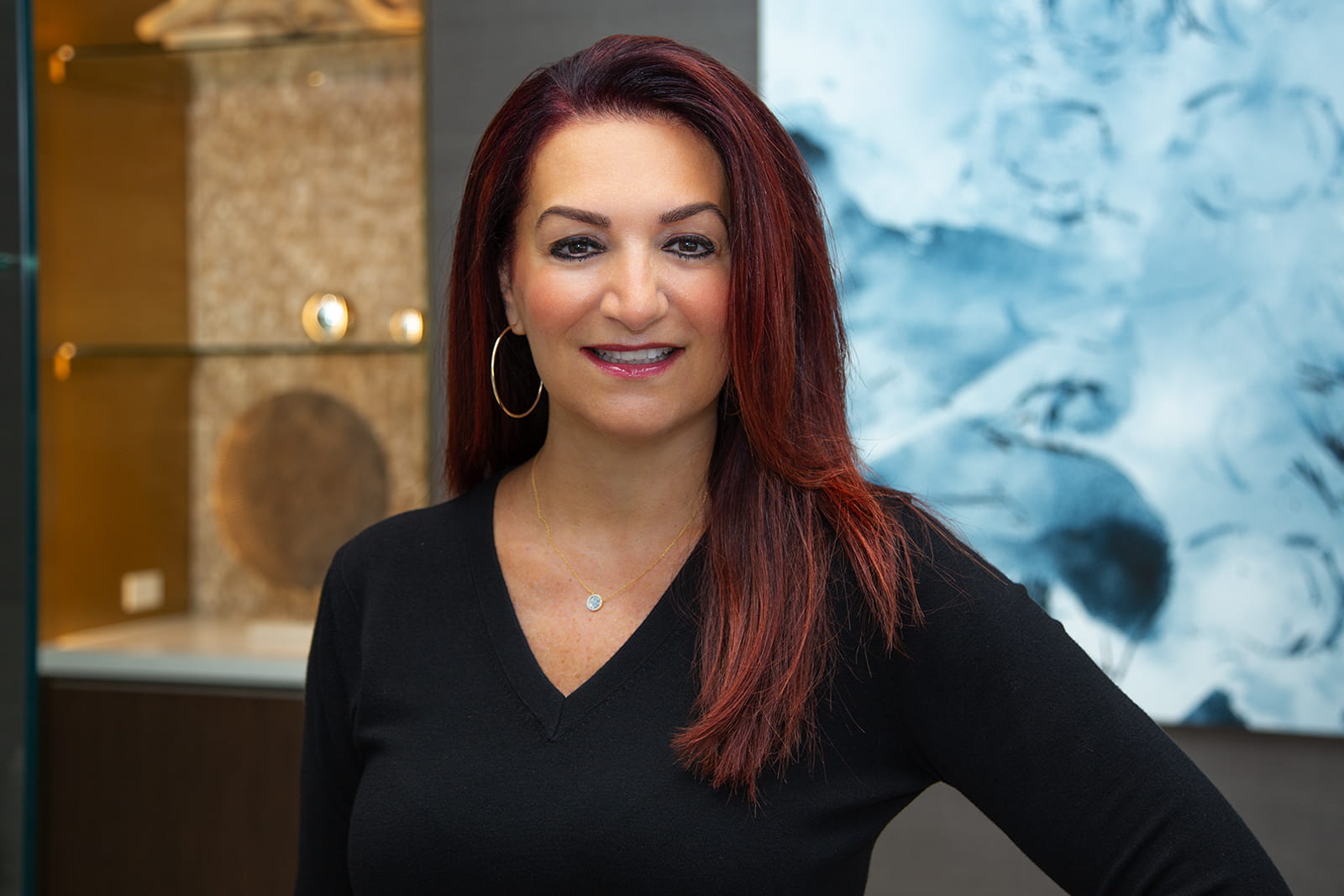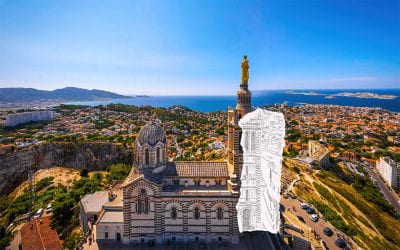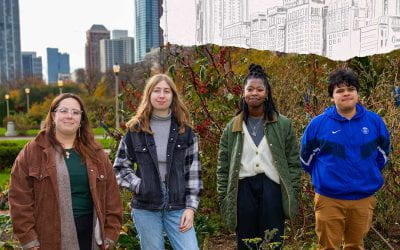Tipping Point
How a senior paralegal fortifies the case for police misconduct victimsOn July 15, a group of attorneys filed a civil lawsuit against the City of Minneapolis and four officers on behalf of George Floyd’s family. The lawsuit, which calls the killing of Black people by police “a public health crisis,” seeks compensatory damages as well as the appointment of an authority to ensure the city properly trains its police officers.
One of the attorneys on the case is Antonio M. Romanucci, a founding partner of the Chicago-based national trial practice Romanucci & Blandin, LLC, where Mirena Fontana (BPS ’12) has worked since 2011. The firm is also representing other families seeking justice in police misconduct cases, some of which include the family of Daniel Prude, a Black man who died after being handcuffed, hooded and forcibly subdued by Rochester, New York police, and the family of Byron Williams, a Black man who was stopped for not having a bicycle light and died in police custody after repeatedly saying “I can’t breathe.”
For many across the country, this moment in time feels like a tipping point in America’s history of racial injustice.
“While the Floyd case will undoubtedly go down in history, I am also proud of the fact that our team has taken on countless cases of injustice and police misconduct over the years,” said Fontana.
“While the Floyd case will undoubtedly go down in history, I am also proud of the fact that our team has taken on countless cases of injustice and police misconduct over the years.”
— Mirena Fontana (BPS ’12)
Fontana began her career at Romanucci & Blandin as an intern while earning her paralegal studies degree and parenting three small children. Today she is a senior paralegal who works on cases that involve police misconduct, civil rights actions and other catastrophic personal injuries.
Fontana spoke to the Roosevelt Review about her career trajectory and her current work.

Mirena Fontana (BPS ’12)
RR: What patterns have you seen in your years of working on police misconduct cases?
Our firm has handled cases involving police misconduct for over 20 years. Because of that, I have seen the disturbing injustices that the public is now really becoming aware of taking place far too often, not only in Chicago but around the country.
The death of George Floyd has truly started a movement, one that I am very proud to be a part of. The entire Floyd legal team, made up of several firms including Ben Crump Law, has been working day and night and will continue to work diligently to obtain justice for George Floyd, his family and all those who came before him.
The hope is for great change and the dissolution of systemic issues and practices that protect those officers who operate outside the law and needlessly cost lives. Helping people is the most gratifying thing we do, and I am confident we will be able to make real change in honor of George Floyd.
“The hope is for great change and the dissolution of systemic issues and practices that protect those officers who operate outside the law and needlessly cost lives.”
— Mirena Fontana (BPS ’12)
RR: Why did you choose Roosevelt for your bachelor’s degree?
I chose to attend Roosevelt University based on its stellar reputation in the legal field and within the paralegal community. Roosevelt programs allowed me to earn my Bachelor of Professional Studies while majoring in paralegal studies and separately earning a certificate from their ABA-approved paralegal program.
The course schedules provided the flexibility to get an education and still be able to raise my children and experience internships concurrently. The professors are all working professionals in the legal field, and it impressed me that I would be able to learn from people who could bring their experience to the classroom.
Because of Roosevelt and within Roosevelt, I gained a support network of mentors, colleagues and contacts. I could call my mentors Carrie Lausen, Chanita Britton or Jim Fine at any time in my new career if I had questions or just needed advice. Each one took me under their wing as a student and generously invited me to come back after graduation and continue to contribute to the Roosevelt community.
RR: How did you get your start in civil litigation?
By a very big stroke of luck, on my first day of paralegal school I was introduced to the Honorable F. Keith Brown, the Chief Judge of Kane County 16th Judicial Circuit Court at that time. He was kind enough to give me some advice and calm my nerves.
I will never forget that conversation. He said, “All you need is for someone to give you a shot.” He also advised me to go out and buy Malcolm Gladwell’s book The Tipping Point and to call when I was ready for an internship.
Six months went by. I called and he remembered! A chief judge with many things on his plate who did not know me at all. He only knew that I was a scared mother of three, trying to get an education and get back on my feet, and he gave me the foot in the door that I needed.
That day was my “tipping point.” My Roosevelt education gave me the confidence to step in the room for an interview, which was impressive to not only the judges in Kane County, but to all I came into contact with.
RR: How has your work evolved at Romanucci & Blandin?
I have been fortunate enough to work at a firm that has encouraged my career growth and given me opportunities of a lifetime. I work on difficult and complex cases alongside the best attorneys in the business, resulting in helping many people secure justice.
I began working on the medical malpractice team and learned that side of the business. I enjoyed that, but after a few years, I was ready for another challenge and was hungry to expand my knowledge on the other types of cases we handle.
To the firm’s credit, they created a role for me that has allowed me new experiences and continued growth. I now concentrate on cases involving police misconduct, civil rights actions, sexual abuse and harassment, sex trafficking, school bullying and hazing, mass torts and class actions, as well as other catastrophic personal injuries.
I am proud to be a senior paralegal at Romanucci & Blandin, and have a seat at the table with these prestigious attorneys.
I think of my role on our legal team as being the glue. I am a part of the case from the very beginning until the last day. Strategizing is part of my job, and the trial prep is a very big part of each case. I know that when I sit down in the room to meet with these very accomplished attorneys that not only am I going to be asked what I think, but that my opinion is also heard and valued.
That right there means the world to me. Feeling valued and respected is very important in this business, and I am fortunate to have that in my work.
RR: What cases have been most rewarding?
It is very difficult to pick — they are all rewarding, and I truly mean that. One part you don’t plan for, is that by the time a case ends, the client has become your family. You have gone down a long road with them, cried together and felt their pain. You really get attached.
One example is in 2019, we took a case to jury for a family that was driving to an outing when they were blindsided in an accident during the police pursuit of a stolen vehicle, against police policies and procedures. Several family members were seriously injured, and a 37-year-old mother of five children lost her life.
We were able to hold the police officers and the City of Chicago liable and responsible for this horrific loss, resulting in the family being awarded a $21.3 million verdict. By the time the grueling litigation was completed and we received the verdict, there was not one dry eye on our side of the courtroom. This family had become our family, and no amount of money would replace that beautiful young mother, sister, daughter, aunt, cousin, friend to all.
That will stay with me forever, and be an inspiration as we continue to fight for justice for others now and in the future.
More in this section
unexcused absence
Some of life’s most important lessons cannot be taught inside the four walls of a classroom. Matthew Beardmore’s travel has forced him to reassess how he thinks about work, family, politics, injustice and many other issues. He’s no longer tied to the beliefs of where he grew up.
traveling while home: self-discovery through the local
How can you make the long trip home if you don’t actually leave there? A partnership between Roosevelt University’s Honors Program and Chicago Architecture Center asks students to experience space and place as sites for action—not simply places we passively inhabit.
creating a new travel niche while wandering the globe
In early 2011, Sahara Rose De Vore bought a one-way ticket to Costa Rica. Over the next 10 years, she explored 84 countries. The self-discovery she experienced inspired her to launch two successful businesses—both helping others discover the benefits of travel.



